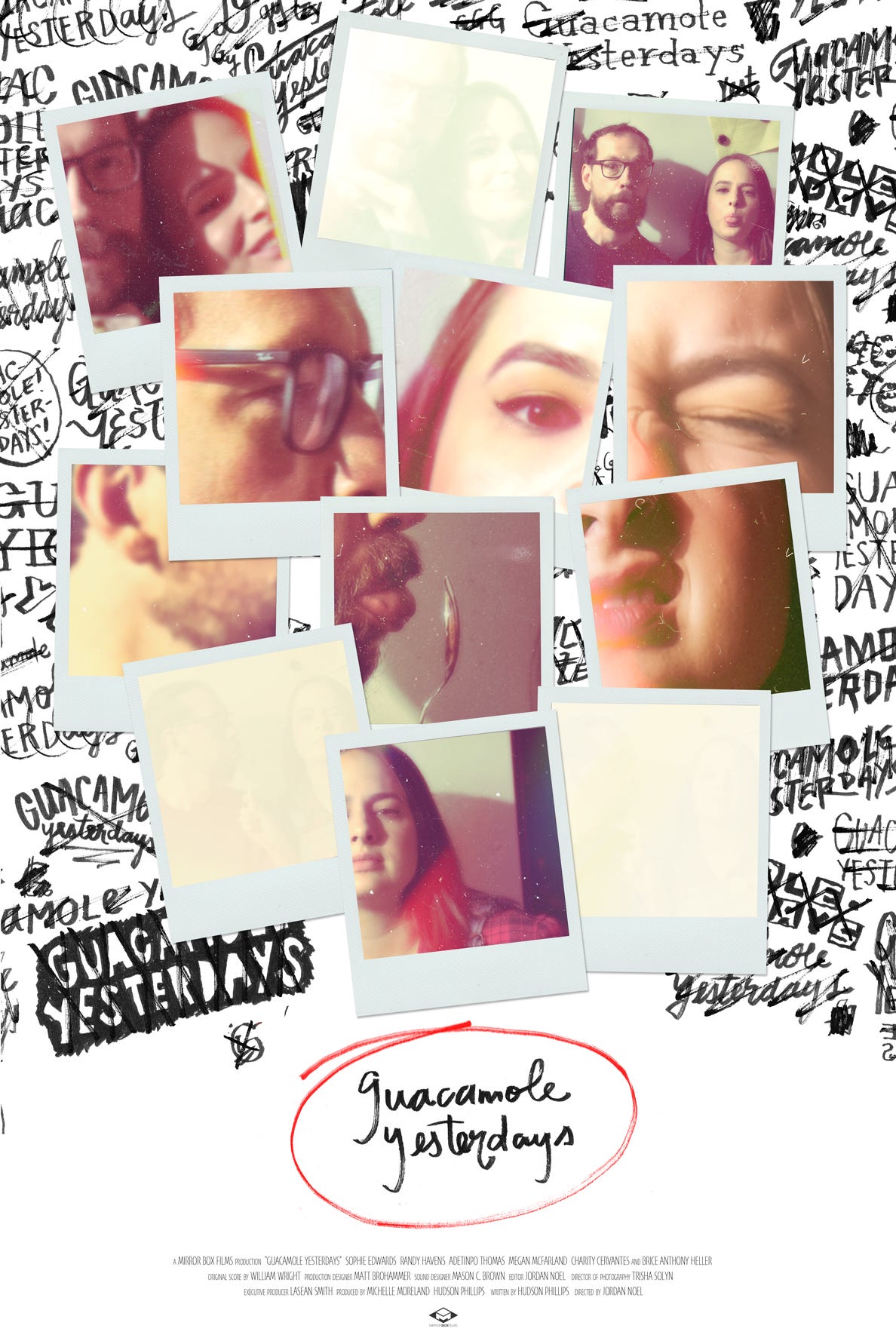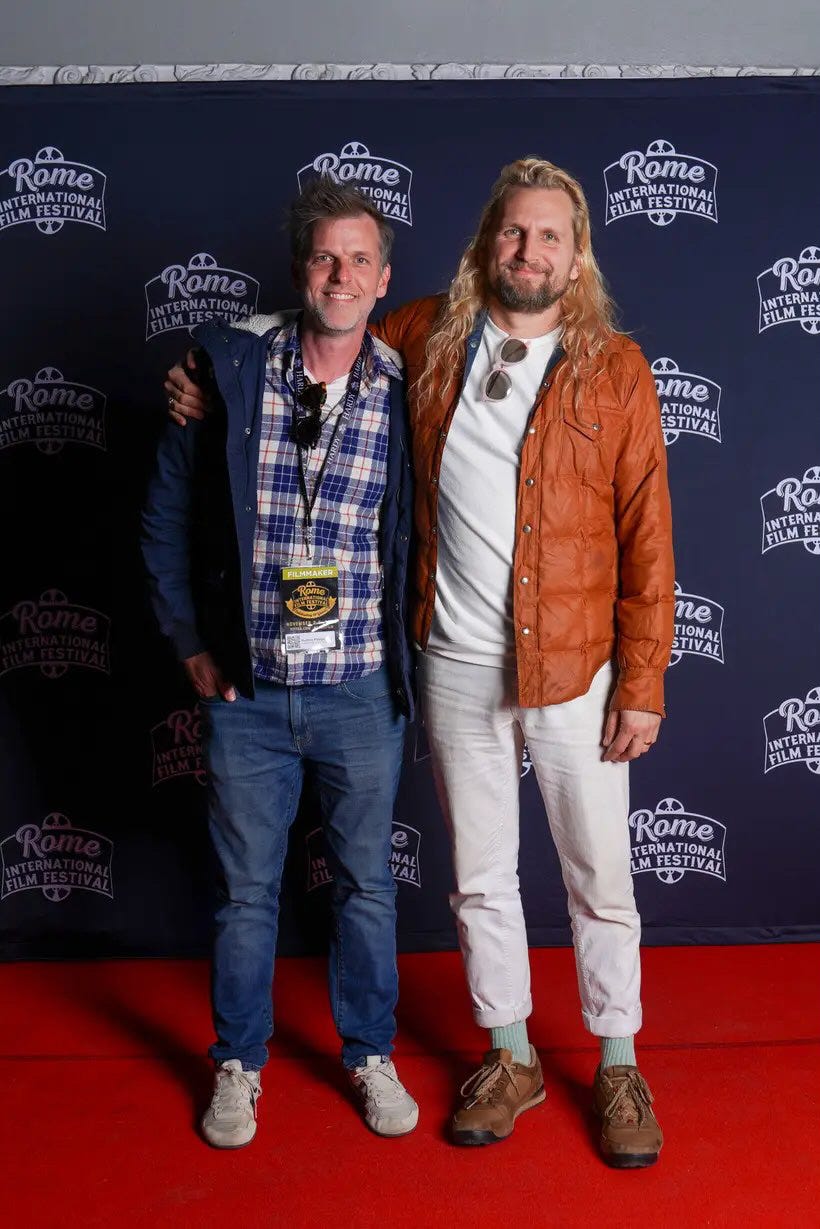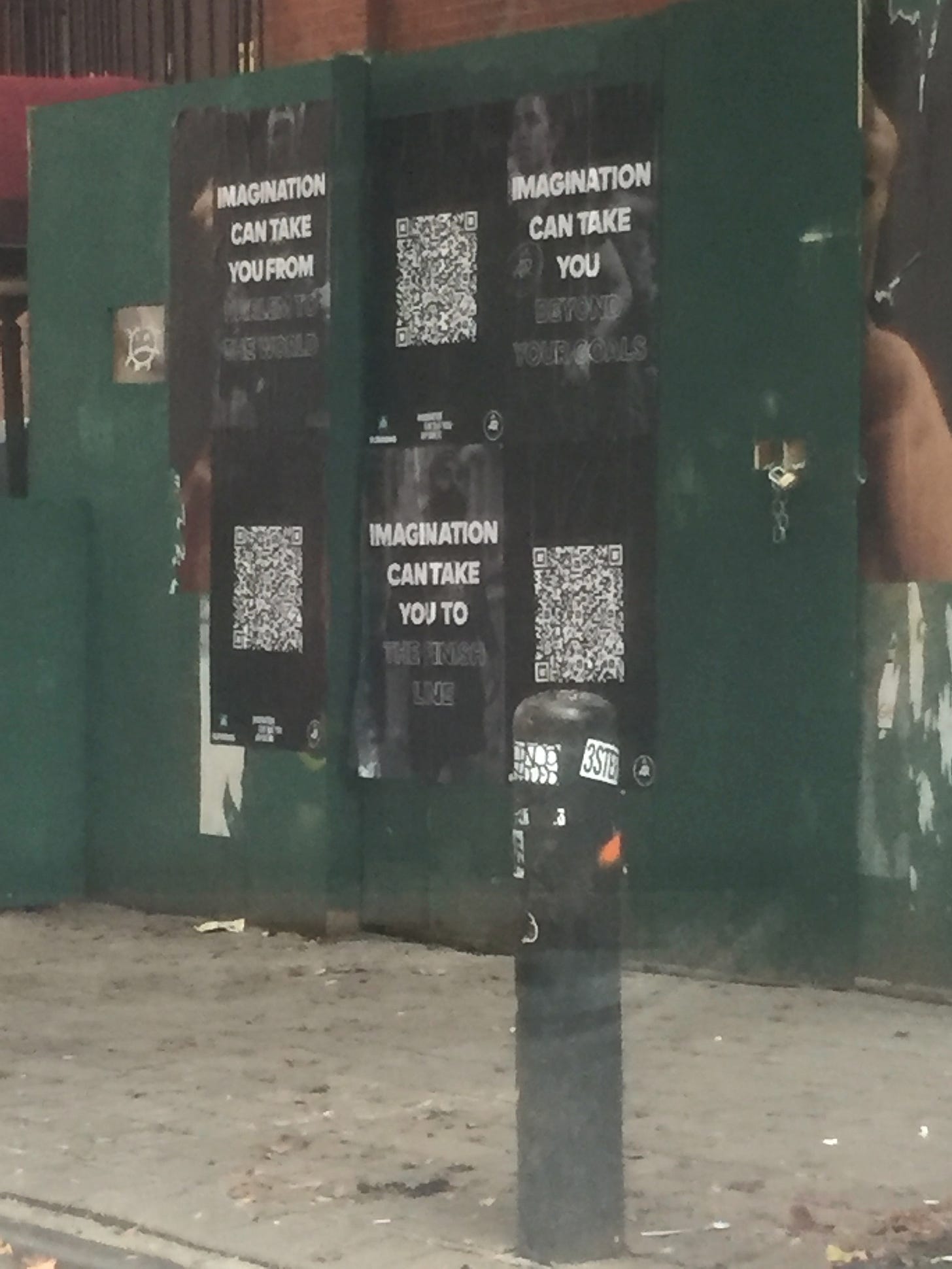The September Issue Part 4:
(Yes! Part 4! Because there are so many incredible filmmakers to introduce you to!)
Hudson Phillips and Jordan Noel are the team behind the grounded sci-fi romance Guacamole Yesterdays. We met at the Omaha Film Festival (a place where programmer Marc Longbrake attests that every filmmaker is treated like a VIP—and it’s true!)
When I was starting out as a playwright, I took a meeting with the literary director of a major regional theater who explained to me that as much as she loved my play, she couldn’t pitch it to her (older, male) artistic director because plays featuring young female protagonists wouldn’t appeal to a mainstream audience. She went on to explain that while women bought tickets and sat through plays about men, men would not do the same—they simply couldn’t relate to these stories.
This is a long way of saying: I was thrilled when Hudson and Jordan each told me that he saw himself in Ramona. I just love these guys, and I am excited to share their creative partnership and work with you here.
BB: Tell our readers about you, how you came up in the industry and what you do.
HP: Here’s the short version of a 20-year-long story: I sold the second screenplay I ever wrote to Lionsgate and struggled to sell another for ten years. I met Jordan, started making short films, fell in love with the producing side, and have now written and produced two feature films: This World Alone and Guacamole Yesterdays.
JN: My career as a filmmaker began with an email wrongfully sent to me (instead of someone else named Jordan) seeking a director for a music video. I knew the band and immediately volunteered, despite having zero experience other than editing travel footage. I wound up directing and editing many music videos. Hudson and I made a short film together and that’s when I really knew that I wanted to direct narrative film.
BB: What inspires you?
HP: Everything! Books, podcasts, movie trailers, nature, family and friends, cooking, art, music, comics, fellow filmmakers, strangers. That's the cool thing about inspiration; when you're looking for it, it's everywhere.
JN: All around us! But for this exercise, I’ll focus on extremes. I love extremes. Big, bold, wild things and itty bitty little almost-forgettable-blink-and-you-miss-it kinds of magical things. Lately, it’s been early Gregg Araki movies, underground death-metal (Pissgrave, specifically), meditations on grief (Joan Didion’s The Year of Magical Thinking, which I finally read last month), male vulnerability (can’t have too much!), bridges (they’re incredible!), math (7th-grade homework silver lining). And things like…the body language of the couple that leaves their therapist at the same time I leave mine or the Amazon delivery dude running back to the truck in a show of hustle, gusto and exuberance or the annual tiny bagworm cocoons on my Eastern Red Cedar or the way my eight-year-old sleeps with her eyes just barely open. I am constantly inspired by witnessing such colossally large and small miracles.
BB: I feel like I see all of that in your film! Tell us about Guacamole Yesterdays.
HP: Guacamole Yesterdays is about a woman, who, following a painful split from her husband, goes to a therapist who allows her to revisit and rewrite her memories in order to find healing. The movie tells their love story through these memories, in and out of order, and a little unreliably. It explores how we let our past define and dictate our present, even though memory is unreliable.
JN: The process was a bit of an odyssey. It’s a very personal film for both Hudson and me….
HP: The process was actually pretty brutal. We had to deal with a small, cramped location, freezing cold weather (a blizzard interrupted two days of our shoot—in Georgia!), we were still deep in COVID-land, and I somehow managed to delete half a day’s footage (don’t ask). We learned a lot of lessons about what not to do in terms of running a set, but are incredibly proud of the results of all those blood, sweat, and tears.
JN: Watching this movie with audiences is a kind of salvation for me. I wrestled with this film for years, from pre-production all the way through editing. I knew I was happy with it when we finished it but it was so personal that I wasn’t at all sure anyone else would like it. The magic, which I believe is a testament to Hudson’s phenomenal writing, is that so many other people find it to be a personal film too. Folks have related to it deeply and genuinely. I think when you put your whole heart into something, vulnerably and honestly, it will find its audience.
HP: In terms of what we learned, I wish we would’ve watched it with an audience while we were still editing. We sent out private screeners for feedback, but watching it with people in a room really accentuates what works and what doesn’t. [BB: this opportunity is part of what we get at festivals!]
BB: How do you collate “artist” and “parent” identities?
HP: For me it’s all about embracing seasons. When my son was little, as a single dad, it was a lot harder to make time for filmmaking or travel. I would often compare myself to younger filmmakers with more time on their hands…but that leads to a lot of resentment and dissatisfaction. Shonda Rhimes, in her book Year of Yes, talks about how work/life balance is a myth—in order to succeed at work, you have to sacrifice at home and in order to succeed at home, you have to sacrifice at work. You’re constantly choosing what to sacrifice on any particular day. So I learned what worked for me. I couldn’t take weeks off to make a movie, but I could wake up early before school every day and write. I used those years to write as much as I could and learn the craft. As my son grew older and more self-sustaining (and I remarried), I got to spend more time actively making things. But it required me to be patient, stop comparing my timeline to others, and learn how to make the most of each season.
JN: Sometimes the two identities are so intertwined they seem wholly inseparable. And sometimes one will squeeze the other out so completely that I feel like half a person. And then, there are so many other things (outside of artist/parent) that I want to be! Identity is a beast with many heads.
When we made This World Alone and my kids were very young, I would get frustrated by the question: Why can’t I parent as well as I direct?! On set, I make space for everyone to have freedom and take ownership of their work. We have a common goal, collaborating to make something great. At home, we don’t necessarily have any common goals! Maybe parenting would be better if I focused more on my editing skills! Maybe I should stop trying to apply filmmaking to parenting altogether! If this all sounds messy it’s because it absolutely is. There is no shortage of squeaky wheels around here and, honestly, the activity of being an artist often has to take a backseat. Occasionally, I have to assure myself that I’m still an artist. Sometimes I have to remind myself that parenting is the more pressing priority. I’ve written thousands of idea notes over the years in moments when there’s only enough bandwidth to jot them down. Sound familiar? With some luck, a handful of them will become something someday.
BB: I hold you two particularly close to my heart because you told me you see yourselves in Ramona (aka, it's not just a mom thing!) Can you elaborate on that?
HP: I think part of what makes movies so magical is their ability to make you feel less alone. Like Ramona, I had some early success as a writer but then all those hopes and dreams just kind of fizzled out. This was also around the time I had a kid, got divorced, and found myself essentially raising my son on my own. I really struggled, feeling pulled in two directions—filmmaking and parenting—both of which bring me deep purpose in life, but I’ve never felt particularly great at either one. And getting older sucks. I’m 46 now, and I keep seeing these memes like So-and-so didn’t break into the business until they were 41! One of the screenwriting groups I’m a part of calls out 40+ as a special minority group. So I’ve got all that stuff swimming around in my head, and watching Ramona at Midlife brought some healing…like, Oh thank God I’m not the only one.
JN: Many parts of Ramona At Midlife were a mirror for me, but none more so than when Carlos tells Ramona, You don’t have to be a rockstar. Sheesh, straight to the jugular. I came up in the music business. I dedicated my teens and twenties, literally, to becoming a rockstar. It didn’t work out, but the spirit remains. I want to be a rockstar in all of my artistic pursuits—as a filmmaker, a visual artist, maybe as a musician again…. I’m still that guy. I’m also another guy: Dad. Carlos was talking to him. I go back and forth on whether I agree with Carlos. Do I know who I am if I'm not a rockstar? I think I have a fear that other parents at the playground (which sometimes, in Nashville, means actual rockstars) are thinking that I used to be a rockstar. After watching Ramona At Midlife, I've thought a lot about that line. Carlos said it to me! And I’m the other parents at the playground. It’s up to me to wrest back my artist self—from me. And I can be a rockstar of a parent while I’m at it.
BB: What's happening with Guacamole Yesterdays and how can people see it?
HP: We are wrapping up our (year-long) festival run this month and (after much deliberation), it's looking like we're going the self-distro route. That's a real Wild West world for us but we're excited to jump in with both feet. We are planning an eventized-style tour with the film in the fall and it should be in living rooms by early 2025. You can find out about all of this stuff by signing up for our mailing list at guacamolelyesterdays.com or following us on social @guacamoleyesterdays.
BB: What are you working on next?
We’ve got another ultra-low feature that’s in pre-production and it’s by far the biggest swing we’ve taken. We haven’t announced it publicly yet, but it’s a grounded and emotional take on giant robots fighting giant monsters.
BB: What do you think other filmmakers should know before heading to a festival?
HP: I think just figure out what you want from the experience. For us, it's very much about relationships. We love connecting with other filmmakers, festival staff, volunteers, and attendees but that takes a commitment to be there for more than a day. That’s why we make movies, so there’s nothing more valuable to us. So, figure out your goals and adjust your plans and expectations based on that.
JN: Screening at a festival is an enormous honor. It’s staggering how many submissions any given festival receives. To be selected is wildly unlikely. This is an opportunity for some real gratitude and humility. It’s also an opportunity for celebration and joy; not just for yourself but for all the other filmmakers having the same experience as you. I find post-production to often be very lonely and difficult. Festivals are a celebration of rebirth from the post-production cocoon. Get to know your fellow butterflies! And the folks who attend film festivals (who aren’t filmmakers themselves) are wonderful people passionate about cinema. Give time and space to hear from these folks who gave what you made their time and attention. You’ll have conversations that might just blow your mind.
BB: Favorite festival hacks?
HP: Always pack a swimsuit. Wear comfy shoes. If there’s an option to walk to your destination, do it. And…don’t feel bad about taking a personal break to breathe or sit in a dark room by yourself. The choice of what to watch can be overwhelming, so try to limit your options (for instance I try to watch the other narrative features and that’s it). If the schedule doesn’t allow you to see a fellow filmmaker's film, ask them for a link.
JN: Movie journal. Get yourself a nice, durable “movie journal” and a fabulous, smooth-writing pen, and bring it to every movie/block you see. You’re going to see A LOT of films—a movie journal is a great way to keep them straight. I’ve been movie journaling since 2013. It’s amazing to not just have a record of everything I’ve seen but also my thoughts on it at the time.
BB: What other advice do you have for filmmakers?
HP: The number of festivals we go to where the filmmakers aren’t in attendance is baffling to me. Only enter festivals you can attend and then attend them! The biggest value you get from a festival is not a laurel, it’s the relationships you make when you’re there.
JN: Festivals often have a “competition” element but that doesn’t mean you have to see each other as competitors. Seeing other films that way takes all the fun out of it and undercuts the community. Also, to echo Hudson, go to as much of the festival as you can including the awards. It’s good for the soul to cheer on the victories of others…and your film might just win something! You don’t want to miss the excitement of that moment, whether you’re receiving an award or celebrating someone else’s win.
BB: Anything else you want our readers to know?
JN: Build community in whatever you’re doing. In the words of the late great Maude, “Go and love some more.”
Subscribe for free to receive new posts and support my work.









Thanks so much Brooke! It's been such a pleasure getting to know you this year! Love this interview and love your movie!